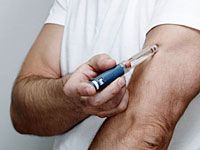Article
Food Insecurity Linked to Mortality in HIV-infected Drug Users
Author(s):
Among HIV-positive injection drug users, food insecurity is associated with mortality despite the use of antiretroviral therapy.

Among HIV-positive injection drug users, food insecurity is associated with mortality despite the use of antiretroviral therapy (ART), a study published in PLOS ONE has uncovered.
In a cross-sectional study, Aranka Anema and colleagues at the University of British Columbia and the University of California San Francisco interviewed 254 drug users initiating ART regimens about their food security status, as well as recorded their gender, body mass index (BMI), and Aboriginal ancestry.
Of the 254 subjects involved in the study, 181 reported food insecurity (71.26%), while an additional 108 who were not food insecure reported being hungry (42.5%). According to the authors, 219 (96.9%) patients had BMIs >18.5 kg/m2.
The researchers discovered significant disparity in mortality rates based on both food security and hunger status. Of the 181 participants that identified as food insecure, 87 (48.1%) died in the research period, compared to only 18 (24.7%) food secure subjects. Moreover, 51.4% of the subjects who reported hunger died during the study, compared to 36.2% of those who reported no hunger.
“This study is the first to examine the potential impact of food insecurity and hunger on mortality among HIV-positive (drug users),” the authors penned, noting their findings “build on our existing body of research regarding the relationship between food insecurity and mortality among people living with HIV/AIDS.”
“The findings speak to the need to explore options for improving the quality of foods available to residents,” study co-prinicipal Brian Chittock noted in a press release. “Further, the results suggest drug users would benefit from improved access to education and counseling around healthy eating, nutritional screening and referral for appropriate clinical care.”
In light of their results, the researchers are now calling attention to food access issues on a larger scale, including “collaborating with the United Nations World Food Program and other international agencies to identify evidence-based practices and policies for the prevention and management of food insecurity among people living with HIV/AIDS,” Anema commented.




